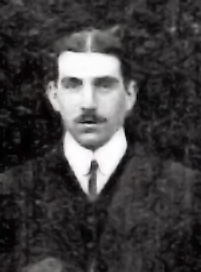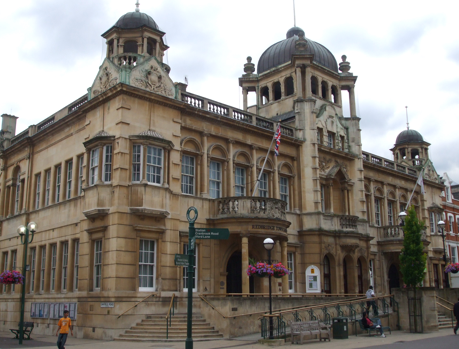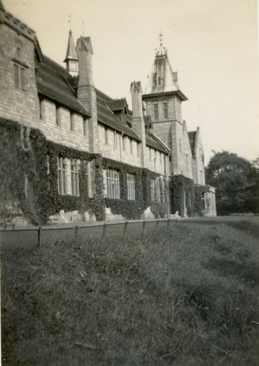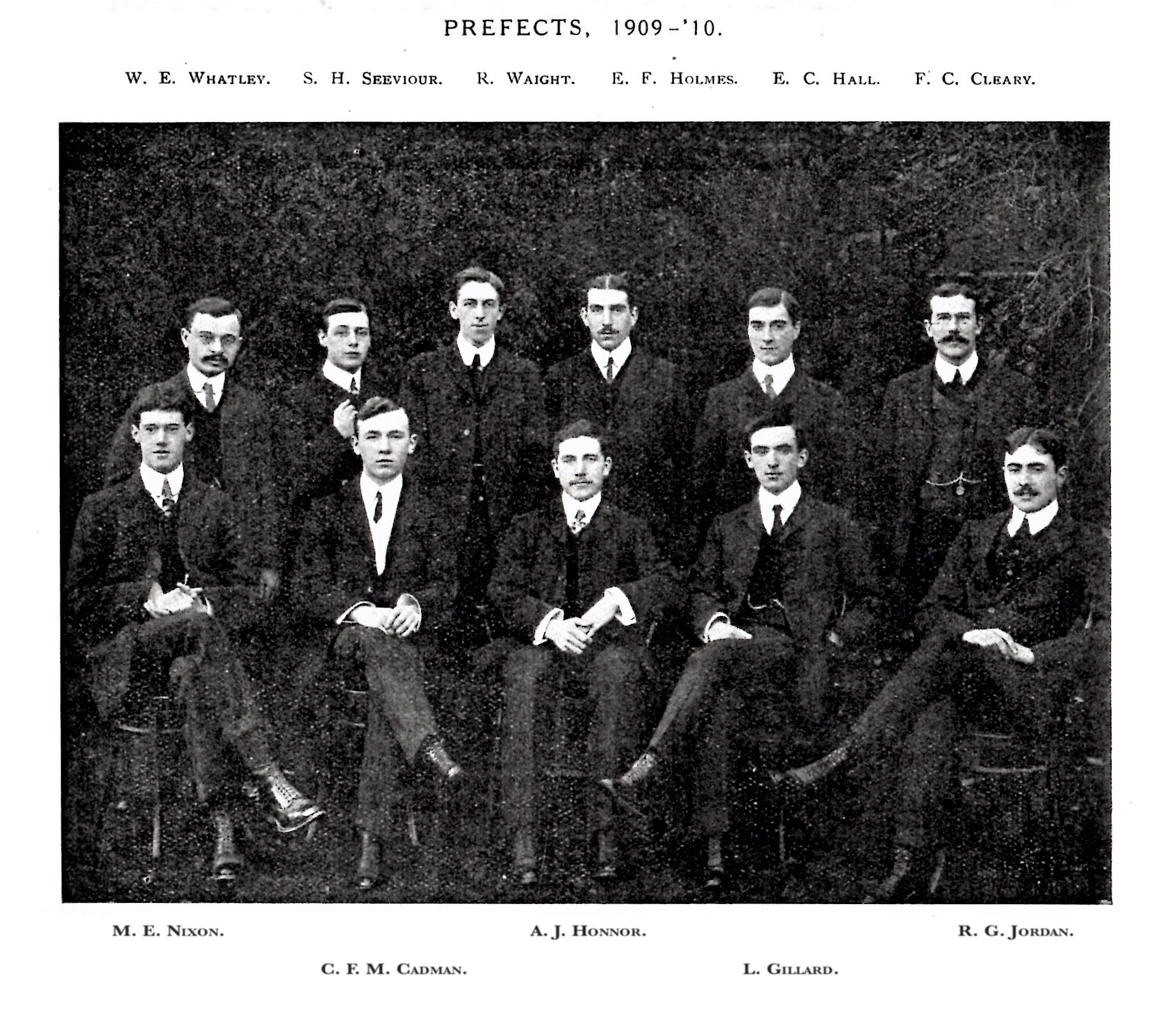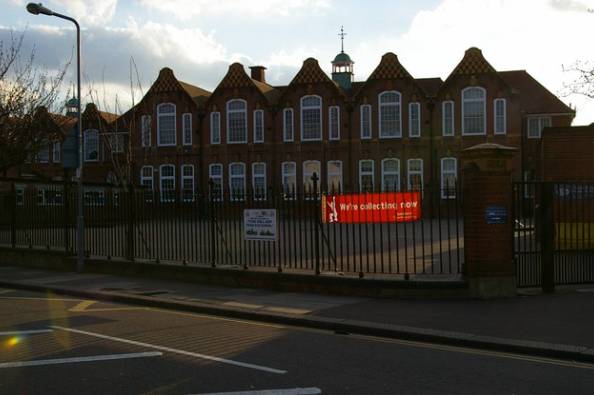Edwin Frederick Holmes
Corporal Edwin Frederick Holmes of the Royal Fusiliers (City of London) Regiment, 11th Battalion, Regimental Number 2146, was killed in action, aged 27, on 17th February 1917, near Grandcourt in the Somme area, and is commemorated on the Thiepval Memorial in France (Panel 16A).
Note: Edwin is incorrectly recorded on the college memorial with the abbreviation for Edward.
Early Life
Edwin was born on the 4th October 1889, the only child of Edwin and Sarah (née Dilley) Holmes, in Ilford, Essex. The 1891 census has them living at 3, Station Road, Ilford. Edwin senior (28) was a builder and decorator. Sarah (30), like most mothers at this time was not employed. Both Edwin and Sarah had been born in the London area. Their son Edwin was aged 2. For a builder and decorator this was an excellent time to be living in Ilford. By 1891 the population of Ilford had risen to 10,913 and during the next twenty years it grew rapidly rising to 78,188 by 1911, with a huge amount of new housing stock being built.
By 1901 the family had moved to 20 Eustace Road, Dagenham. Edwin senior was now described as an employer and a builder. Edwin was educated at the Board School in Chadwell Heath. Ten years later they were still living at 20, Eustace Road, but Edwin, now 22 years of age was employed as a schoolteacher for the Ilford Education Committee.
The Student Record Book tells us that Edwin was working as an assistant teacher at Goodmayes Boys’ School, Ilford. Edwin took his Preliminary Examination for entry to College in April 1907, gaining a distinction in Mathematics. He had also passed examinations in drawing, and gained a second class pass in the Archbishops’ Preliminary Examination. His mark in his entrance exam was recorded as 68.5%.
Training to Teach
The students had to work very hard to achieve a place at a training college and they were expected to work hard while they were there. The timetable was demanding and there were plenty of activities to fill up what little free time they had left. From the Wintonian Magazine, written by the students, we get a picture of some of the activities the students participated in, including sporting events, debates and social evenings with lots of musical talent on display. Edwin does not get mentioned by name during his two years at Winchester, but there are some articles written during the time he was there that give us an impression of what life there may have been like for him. In their first year at College the students were referred to as Juniors. The Junior Jottings section of the 1908-1910 magazine describes the early days at College:
Our year as Juniors has been a very pleasant one. Within a month of arriving in Winton we had learnt to know and love our College as our home, this being very largely due to the hearty welcome and steady friendship of the Seniors individually and collectively.
Some members of the year have started their practical teaching at the Practising School. This is a pleasant time to which the remainder have to look forward. It entails a greater amount of work than ordinary life at College, especially in the preparation of lessons in the evening. Several have already experienced the great strain that is made on the vocal organs, particularly those who rely on a loud voice to preserve discipline in the class. As this part of our work here is of the highest importance, we are pleased to see the energy and interest displayed in it.
Although he does not receive mention for sporting or musical prowess, Edwin must have made a good impression as he was one of the prefects in his senior year.
Edwin showed particular ability in mathematics and science. At the end of his first year he achieved 197/200 in his general science exam and 98/100 in mathematics, and was placed 4th in the order of merit. At the end of his two year course, Edwin was awarded A grades for Music, Drawing and Science, B for Teaching and C for Recitation. In his final Certificate Examination, he achieved distinctions in Teaching, Hygiene, Physical Exercises and Mathematics. Edwin was also awarded the Percentage Prize, for students who had obtained at least 75 percent in their college results, and was placed 3rd in the order of merit. It will be no surprise to discover that as he was obviously an academic student, he gained a first class pass in the Archbishops’ Exam.
Prefects 1909-10 From the Wintonian Magazine 1908-1910
a new book published by G Bell and Son and written by E.F.Holmes along with the Headmaster of his school and another teacher at South Park School, Ilford. It was called Outdoor and Indoor Experimental Arithmetic and was considered by the magazine reviewer to be one of the very best books we have been sent.
From Schoolmaster to Soldier
In November 1914 Edwin enlisted in London, in the 6th Battalion the Essex (TF) Regiment. Records have not yet been found to discover whether Edwin served abroad with the 1/6th or 2/6th Essex Regiment or whether he was in the 3/6th who remained in this country. In February 1916 Edwin transferred to the Royal Fusiliers (City of London Regiment) 11th Battalion. Later that year in April 1916, Edwin married Florence Ellen Grose in Anerley, Surrey. Florence was also a teacher.
The Royal Fusiliers raised 47 battalions for service in the Great War. The 11th (Service) Battalion was formed at Hounslow in September 1914 and came under the command of 54th Brigade, 18th (Eastern) Division. They landed in France in July 1915.
Between January and March 1917 the Regiment was involved in operations on the Ancre. This was the final clearing up stage of operations following the Somme offensive of 1916. British troops were seeking to gain a tactical advantage by occupying the high ground above the River Ancre. Sir Douglas Haig’s third Despatch describes the day that Edwin was killed in action.
Our assault was delivered simultaneously on both banks of the Ancre at 5:45 am on the 17th February. The night was particularly dark, and thick mist and heavy conditions of ground produced by the thaw that had just set in added to the difficulties with which our troops had to contend. The enemy was, moreover, on the alert, and commenced a heavy barrage sometime before the hour of our assault, while our attacking battalions were still forming up. None the less, our troops advanced to the assault with great gallantry. On the left of our attack our artillery preparation had been assisted by observation from the positions already won on the right bank of the Ancre. In consequence, our infantry were able to make a very considerable advance, and established themselves within a few hundred yards of Petit Miraumont. The right of our attack encountered more serious resistance, but here also valuable progress was made. North of the Ancre our troops met with complete success. The whole of the position attacked, on a front of about half-a-mile, was secured without great difficulty, and an enemy counter-attack during the morning was easily driven off.
When 54th Brigade advanced they found that the wire in their area had not been cut, delaying their advance and allowing them to fall even further behind the creeping barrage. While they were looking for gaps in the wire the Germans were able to open fire on the British infantry.
Edwin Holmes was killed that day in action near to Grandecourt. His Captain wrote:
I hope you will feel it some source of consolation and pride to know that he fell showing a fine example of steadiness and coolness under heavy shell fire, at a time when all the officers around him had become casualties.
His probate record shows that he left £398 10s 4d. It appears on first glance that he left the money to his father rather than to his wife, but a closer look shows that his father was named as his executor and therefore it is possible that Florence, his wife was ultimately the beneficiary.
Edwin’s body was either never found or not identified. He is commemorated on the Thiepval Memorial, Pier and Face 16A.
The Royal Fusiliers’ War Memorial stands on High Holborn, near Chancery Lane tube station. Their Regimental Chapel is at St. Sepulchre-without-Newgate.
Researcher and Author: Dee Sayers
Sources
Ancestry (2018). Home page. [online] Available at: www.ancestry.co.uk [Accessed 2018].
British History Online (1966). The Borough of Ilford, pp.249-266. [online] Available at: www.british-history.ac.uk/vch/essex/vol5/pp249-266 [Accessed 2018].
Commonwealth War Graves Commission, (2018). Home page. [online] Available at www.cwgc.org/ [Accessed 2018].
Geograph (2018). South Park School. [online] Available at: www.geograph.org.uk/photo/151907 [Accessed 2018].
The Long Long Trail, (2018). Welcome to the long long trail. [online] Available at: http://www.longlongtrail.co.uk/ [Accessed 2018].
National Union of Teachers. (1920). War Record 1914“1919. A Short Account of Duty and Work Accomplished During the War. London: NUT.
Vickers, J. University of Winchester Chapel Memorial Rail image.
Wikimedia (2018). File:Ilford Redbridge Town Hall. [online] Available at: https://commons.wikimedia.org/wiki/File:Ilford_Redbridge_Town_Hall [Accessed 2018].
Wikipedia (2018). Operations on the Ancre, January-March 1917. [online] Available at: en.m.wikipedia.org/wiki/Operations_on_the_Ancre,_January-March_1917 [Accessed 2018].
| University of Winchester Archive “ Hampshire Record Office | ||
| Reference code | Record | |
| 47M91W/ | P2/4 | The Wintonian 1899-1900 |
| 47M91W/ | P2/5 | The Wintonian 1901-1902 |
| 47M91W/ | P2/6 | The Wintonian 1903-1904 |
| 47M91W/ | P2/7 | The Wintonian 1904-1906 |
| 47M91W/ | P2/8 | The Wintonian 1905-1907 |
| 47M91W/ | P2/10 | The Wintonian 1908-1910 |
| 47M91W/ | P2/11 | The Wintonian 1910-1914 |
| 47M91W/ | P2/12 | The Wintonian 1920-1925 |
| 47M91W/ | D1/2 | The Student Register |
| 47M91W/ | S5//5/10 | Photograph of 5 alumni in Mesopotamia |
| 47M91W/ | Q3/6 | A Khaki Diary |
| 47M91W/ | B1/2 | Reports of Training College 1913-1914 |
| 47M91W/ | Q1/5 | Report and Balance Sheets 1904- 1949 |
| 47M91W/ | R2/5 | History of the Volunteers Company 1910 |
| 47M91W/ | L1/2 | College Rules 1920 |
| Hampshire Record Office archive | ||
| 71M88W/6 | List of Prisoners at Kut | |
| 55M81W/PJ1 | Managers’ Minute Book 1876-1903 | |
| All material referenced as 47M91W/ is the copyright of The University of Winchester. Permission to reproduce photographs and other material for this narrative has been agreed by the University and Hampshire Record Office. | ||


